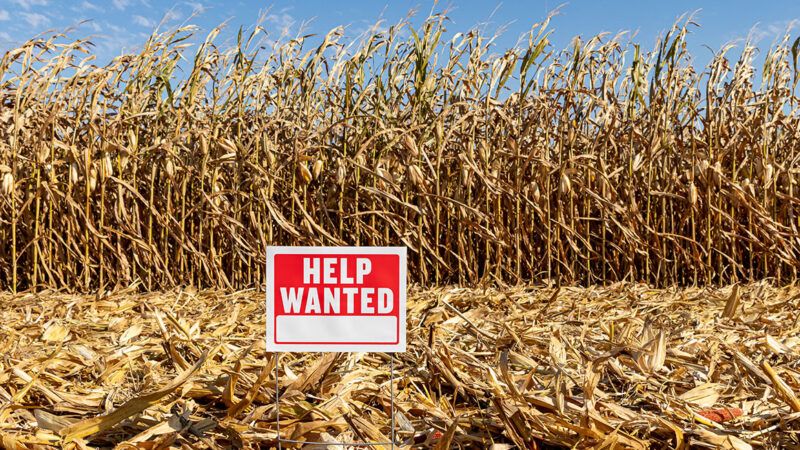America Needs 'Low-Skilled' Workers
Yes, America benefits from immigrants who can write code. But we also need ones who can swing hammers.

At a moment when even modest immigration reform is politically contentious, several Republicans in Congress are open to letting in more "high-skilled" immigrants. But that approach overlooks the fact that the country would benefit from admitting workers at all skill levels.
"Skills-based immigration reform" is "essential to maintaining our national competitiveness," Sen. Todd Young (R–Ind.) said in March. "We want to encourage the best and the brightest from all over the world to be able to come here legally," Sen. James Lankford (R–Okla.) concurred in April.
Among Americans who believe the country should accept fewer immigrants, a 2019 Pew Research Center survey found, 63 percent still supported "encouraging highly skilled people to immigrate and work" here. "Selectionism," or deciding whom to admit "on the basis of promoting the national interest," Manhattan Institute President Reihan Salam argued in The Atlantic in June, could help "ambitious Republicans….assuage the concerns of their base." A central pillar of selectionist policy, Salam wrote, is "attracting superstar talent."
But "low-skilled" immigrants—those who work in factories, on farms, and in other largely manual fields—are also vital to American prosperity. What's more, admitting more of those immigrants could help alleviate some of the economic strain that everyday Americans face.
Reforming the H-2A visa program, which brings temporary agricultural workers to the U.S., could help address labor shortages plaguing American farms. The American Farm Bureau Federation notes that the program "provides less than 4 percent of the hired workers needed in agriculture" and that they are often admitted too late in the season. Those shortages and delays lead to smaller harvests, which translate into higher food prices. A June paper by researchers at Texas A&M International University found that admitting more temporary agricultural workers was associated with lower inflation.
Meanwhile, job openings in the construction industry last year hit their highest levels since the early 2000s, which has helped inflate homebuilding costs. "We built 2 million homes a year in the early 2000s," Christopher Herbert, managing director of Harvard's Joint Center for Housing Studies, noted at a July congressional hearing. "A lot of that was through immigration."
Labor shortages "make it difficult for developers to build modestly priced housing," Herbert's center noted in its annual housing report. Among the more than 1 million Central Americans deported from the U.S. in the last 20 years, according to a Brookings Institution study published in July, "about 60 percent were in the construction industry."
America needs immigrants who are good with computers and immigrants who are good with hammers. Our immigration policy should not treat them as mutually exclusive.


Show Comments (101)